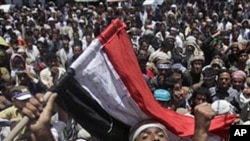Yemen's opposition coalition has agreed to participate in a transitional government under a Gulf-negotiated plan that would remove President Ali Abdullah Saleh from power after 30 days.
Opposition leaders said Monday they will take part in a national unity government after "receiving clarifications" from the six-nation Gulf Cooperation Council. Earlier, the coalition of seven opposition parties said it would stay out of a unity government.
|
Robert Powell, senior Middle East analysts with The Economist Intelligence Unit, discusses the agreement in an interview with Susan Yackee:
|
The Council plan has yet to be formally accepted by the opposition or by Saleh. Despite these political developments, widespread street protests continue in Yemen.
Clashes Monday between security forces and anti-government protesters left at least two of the protesters dead. Dozens of others were wounded.
Anti-government protest leaders continue to reject the Gulf Cooperation Council plan, instead demanding Saleh's immediate departure. They are opposed to a provision in the plan that grants Mr. Saleh and his family immunity from prosecution for crimes committed during his 32 years in power.
The protests have been continuing almost non-stop for the past two months.
Some information for this report was provided by AFP and Reuters.












